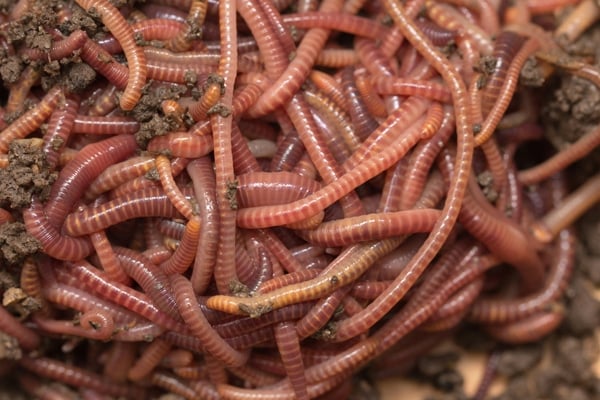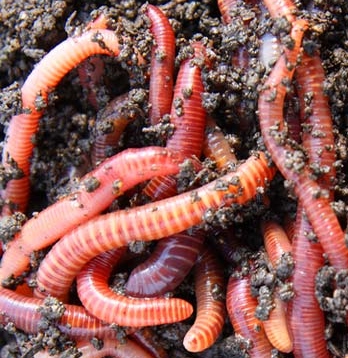Using Red Wigglers for Reliable Organic Waste Disposal
Using red wigglers for natural waste disposal presents a compelling approach to taking care of food scraps while advertising ecological sustainability. These worms not just enhance waste decay however also produce important worm spreadings, which can substantially enhance dirt health and wellness. Their capacity to process large volumes of natural product with minimal effort positions them as an available solution for households and neighborhoods alike. Nevertheless, understanding the subtleties of setting up an effective worm bin and maintaining an ideal environment is vital for optimizing their benefits. The next actions in this procedure may shock you.
Advantages of Making Use Of Red Wigglers
One of the most engaging benefits of using red wigglers for natural waste disposal is their impressive efficiency in composting. These worms, clinically called Eisenia fetida, are particularly adjusted for damaging down organic products, allowing them to refine waste up to two times their body weight daily. This rapid decay not only speeds up the composting procedure yet also creates nutrient-rich worm spreadings that dramatically improve dirt quality.
Additionally, red wigglers add to a reduction in garbage dump waste. By diverting natural materials from land fills, they assist lessen methane emissions-- a potent greenhouse gas. This eco-friendly advantage is crucial in the battle against environment change.
Moreover, red wigglers are low-maintenance and can flourish in various settings, making them obtainable for both beginner and experienced composters. Their capacity to reproduce quickly makes certain a stable population, helping with recurring waste handling.
Establishing Your Worm Bin
Producing a reliable worm container is crucial for taking full advantage of the advantages of composting with red wigglers. The primary step is picking a proper container. A container made from plastic or wood, with an ability of 10 to 20 gallons, is excellent. Make certain the bin has sufficient drain holes to avoid excess wetness, as red wigglers thrive in a wet however not soggy setting.
(red wigglers)Following, prepare the bedding material, which serves as the worms' environment and food resource. The container needs to be placed in a dark, temperature-controlled location, ideally in between 55 ° F and 77 ° F, to keep worm activity.
As soon as the container is set up, present the red wigglers, allowing them to accustom to their brand-new environment. It's important to keep an eye on moisture levels and temperature frequently. A properly maintained bin will not just sustain the wellness of the worms yet also assist in effective decay of natural waste. By adhering to these standards, you can create a flourishing ecosystem that adds to lasting waste administration.
(Lake James Bait)
What to Feed Red Wigglers
An understanding of the suitable diet plan for red wigglers is essential for preserving a healthy and balanced worm population and maximizing composting effectiveness. Red wigglers thrive on a diverse diet regimen that largely includes natural materials. Suitable food sources include vegetable scraps, fruit peels, coffee premises, eggshells, and shredded paper. These products not only supply necessary nutrients however likewise add to the wetness equilibrium within the worm container.
It is important to avoid specific foods that can hurt the worm population. Red wigglers should not be fed meat, dairy products, oily foods, or processed products, as these can attract insects and develop undesirable smells. red wigglers. In addition, citrus fruits and zesty foods need to be reduced, as their level of acidity can be damaging to worms
Keeping an eye on the worm container for food usage prices will certainly assist make certain that red wigglers are obtaining an adequate diet regimen while keeping an effective composting setting. Correct feeding techniques are vital for promoting a prospering community within the worm bin.
Maintaining Your Worm Habitat
A properly maintained worm habitat is important for the health and wellness and efficiency of red wigglers. To make sure optimum conditions, it is crucial to monitor temperature level, wetness, and oygenation within the worm bin (red wigglers).
Moisture degrees should be kept consistent; the bed linens must perspire but not soaked. An excellent regulation of thumb is to preserve moisture at roughly 70% to 80%. If the bed linens ends up being also damp, it can lead to anaerobic conditions that are hazardous to the worms. Including dry carbon-rich products, such as shredded paper or cardboard, can aid take in excess wetness.

Making Use Of Worm Castings in Gardening
Rich in nutrients and advantageous microorganisms, worm spreadings work as a phenomenal natural plant food for gardening. Generated with the digestion processes of red wigglers, these spreadings include a selection of essential nutrients, consisting of nitrogen, phosphorus, and potassium, which promote durable plant growth. Unlike synthetic plant foods, worm spreadings use a slow-release device, guaranteeing that nutrients are readily available to plants over an extended duration, consequently lowering the risk of nutrient leaching and soil exhaustion.
In enhancement to nutrition content, worm castings improve dirt structure and oygenation, enhancing wetness retention and drainage. The microbial life present in worm castings aids to subdue microorganisms and advertises a healthy dirt environment, further benefiting plant health and wellness. When incorporated right into the soil or made use of as a leading dressing, worm castings can substantially improve seed germination rates, origin development, and overall plant vitality.
For ideal outcomes, garden enthusiasts should use worm spreadings at a price of 1-2 inches per square foot, blending them right into the soil or integrating them right into potting mixes. In general, utilizing worm castings is an eco-friendly strategy to enhancing dirt fertility and ensuring prospering yard settings.
Conclusion
